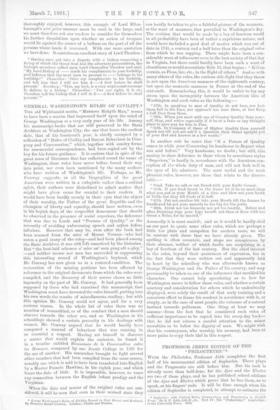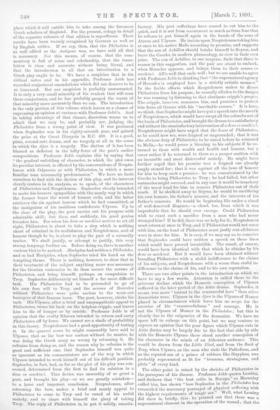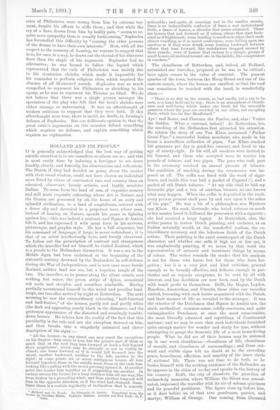PROFESSOR JEBB'S EDITION OF THE " PHILOCTETES,"*
WITH the Philoctetes, Professor Jebb completes the first half of his monumental edition of Sophocles. Three plays and the Fragments are still before him. But his task is already more than half-done, for the Ajax and the Electra are two of those plays, and he has published school editions of the Ajax and Electra which prove that he has them, so to speak, at his fingers' ends. It will be time enough when his edition of Sophocles is completed, to attempt to estimate the —*Sophocles: with Critical Notes, Commentary, and Translation in English Prose. By It. C. Jobb, Litt.D., Zee, Part IV. Tile "Philootetes." Cambridge at the University Press. 1890. place which it will entitle him to take among the foremost Greek scholars of England. For the present, eulogy in detail of the separate volumes of that edition is superfluous. Their merits have been warmly recognised by German as well as by English critics. If we say, then, that the Philoctetes is as well edited as the Antigone was, we have said all that is necessary. For this means, of course, that the com- mentary is full of sense and scholarship, that the trans- lation is close and accurate without being literal, and that the introduction is all that an introduction to a Greek play ought to be. We have a suspicion that in his critical notes and in his appendix, Professor Jebb has recorded conjectural emendations which did not deserve to be so honoured. But our suspicion is probably unwarranted. It is only a very small minority of his readers that will scan these conjectures, and he has probably gauged the wants of that minority more accurately than we can. The introduction is the only portion of this volume which leaves us a chance of expressing an opinion at variance with Professor Jebb's. And in taking advantage of that chance, discretion warns us to admit that we may be, and probably are, judging the Philoctetes from a wrong point of view. It was produced when Sophocles was in his eighty-seventh year, and gained the prize at the Great Dionysia in B.C. 409. It is a good, plain, second-rate drama, and no tragedy at all in the sense in which the Ajax ie a tragedy. The diction of it has been blamed as deficient in the lofty force of the poet's earlier compositions. Professor Jebb explains this by saying that " the gradual unfolding of character, to which the plot owes its peculiar interest, is effected by the conversations of Neopto- lemus with Odysseus or with Philoctetes, in which a more familiar tone necessarily predominates." We have no fault ourselves to find with the diction of this play, and its interest clearly centres in its analysis, so to speak, of the characters of Philoctetes and Neoptolemus. Sophooles clearly intended to make his hearers sympathise with the manly way in which the former bears the worst of human evils, and the latter retrieves the sin against honour which he had committed, at the instigation of his insidious confederate Ulysses. Up to the close of the play, the poet carries out his purpose with admirable skill; but then, and suddenly, his good genius forsakes him. For when his dens ex machinri arrives to set all right, Philoctetes is about to take a step which is nothing short of criminal in its mulishness, and Neoptolemus, soul of honour though he be, is about to play the part of a cowardly traitor. We shall justify, or attempt to justify, this very strong language further on. Before doing so, there is another curious blot to be noticed. sEschylus had written a Plitloctetes, and so had Euripides, when Sophocles tried his hand on the tempting theme. There is nothing, however, to show that in their treatment of the subject anything more was necessary for the Grecian emissaries to do than secure the arrows of
Philoctetes, and bring himself, perhaps, on compulsion to Troy. Sophocles deliberately set himself a far more difficult
task. His Philoctetes had to be persuaded to go of his own free will to Troy, and the arrows of Hercules without Philoctetes were quite useless to the worn-out besiegers of that famous town. The poet, however, shirks his task. His Ulysses, after a brief and unsympathetic appeal to Philoctetes, turns his back on the helpless cripple, and leaves him to die of hunger or by suicide. Professor Jebb is of opinion that the crafty Ithacan intended to return and carry Philoctetes off by force. We cannot see a shade of probability in this theory. Neoptolemus had a good opportunity of testing it. In the quarrel scene he might reasonably have said to Ulysses, that as the bow was useless without its master, he was doing the Greek army no wrong by returning it. He refrains from doing so, and the reason why he refrains is the good and sufficient one, that Sophocles himself was quite as ignorant as his commentators are of the way in which Ulysses intended to work himself out of his difficult position. Sophocles, in fact, had, so far as the plot of his play was con- cerned, determined from the first to find its solution in a dens ex machind. This device was unworthy of so great a poet, and brought his play—or we are greatly mistaken— to a lame and impotent conclusion. Neoptolemus, after returning the bow, makes a brief and manly appeal to Philoctetes to come to Troy and be cured of his awful malady, and to share with himself the glory of taking Troy. The reply of Philoctetes is, to put it mildly, unsatis-
factory. His past sufferings have ceased to cut him to the quick, and it is not from resentment so much as from fear that he refuses to put himself again in the hands of the sons of Atreus and Ulysses. He insists upon Neoptolemus taking him at once to his native Malls according to promise, and suggests that the son of Achilles should betake himself to Scyros, and leave the Greeks, in modern phraseology, to stew in their own juice. The eon of Achilles, to our surprise, finds that there is reason in this suggestion, and the pair are about to embark, when Hercules appears, and brings them to their senses ex machind. All's well that ends well ; but we are unable to agree with Professor Jebb in thinking that "the supernatural agency of Hercules is employed here in a strictly artistic manner." In the feeble efforts which Neoptolemus makes to divert Philoctetes from his purpose, he casually alludes to the danger he was running by listening to that obstinate cripple's prayer. The cripple, however, reassures him, and promises to protect him from all Greece with his "inevitable arrows." It is here, we think, that Sophocles might have put a speech into the mouth of Neoptolemus, which would have swept all the cobwebs out of the brain of Philootetes, and brought the drama to a satisfactory end without the unsatisfactory intervention of a dens ex machind Neoptolemus might have urged that the fears of Philootetes, as he could now see, were feigned or ungrounded ; that it was the obvious duty of Philoctetes to be cured before he returned to Malis,—he would prove a blessing to his subjects if he re- turned to them with wealth and health and honour, but a curse rather if he returned to them as a pauper smitten with an incurable and most distressful malady. He might have further urged that his promise was a feigned one already amply atoned for; that it was against all the laws Of honour for him to keep such a promise : he was commissioned by the Greeks to bring Philoctetes to Troy ; he had failed, but other emissaries might succeed, and in any case it would be treachery of the worst kind for him to remove Philoctetes out of their reach. If he skulked away to Scyros, he would be sacrificing his own honour, his father's armour, and the interests of his father's veterans. He would be beginning life under a cloud of well-deserved disgrace,—a cloud, too, from which it was improbable that be should ever emerge. Could Philoctetes wish to exact such a sacrifice from a man who bad never wronged him ? If he did, there was no help for it ; Neoptolemus must return at once to Troy, and if Philoctetes would not come with him, on the head of Philoctetes must justly rest all future woes in store for him. It is easy, if we may say so, to conceive that Sophocles could have written a speech on these lines which would have proved irresistible. The result, of course, would have been identical with that which he obtains by his dens ex machind. But it would have been obtained without branding Philoctetes with a stolid indifference to the claims of his subjects, and Neoptolemus with a worse than stolid in- difference to the claims of his, and to his own reputation.
There are two other points in the introduction on which we have to say a few words. Attention is called there to the grievous decline which the Homeric conception of Ulysses suffered in the later period of the Attic drama. Sophocles, it seems, was more lenient to the resourceful hero" than other dramatists were. Ulysses in the Ajax is the Ulysses of Homer placed in circumstances which leave him no scope for the exercise of his " resourcefulness " and courage. He is not the Ulysses of Homer in the Philoctetes ; but this is clearly due to the exigencies of the dramatist. We have no space left to enlarge on this point, but we may venture to express an opinion that the poor figure which Ulysses cuts in Attic draMa may be largely due to the fact that side by side with the Homeric Ulysses there stood another conception of his character in the minds of an Athenian audience. This would be drawn from the Little Iliad, and from the Sack of Troy, when Ulysses, as the man who stole the Palladium, and as the reputed son of a prince of robbers like Sisyphus, was probably represented as fit for " treasons, stratagems, and plots" of every kind.
The other point is raised by the shrieks .of Philoctetes in the paroxyms of his disease. Professor Jebb quotes Leasing, and declares that "the best critic in Europe," as Macaulay called him, has shown "how Sophocles in the Philoctetes has reconciled the necessary portrayal of physical suffering with the highest requirements of tragic art." Well, what Leasing did show is, briefly, this : he pointed out that there was a supernatural element in the operation of the wound ; that the
cries of Philoctetes were wrung from him by extreme tor- ment, despite his efforts to stifle them ; and that while the cry of a hare, drawn from him by bodily pain, " seems to re- quire more sympathy than is usually forthcoming," Sophocles has forestalled this difficulty by " causing the other persons of the drama to have their own interests," Now, with all due respect to the memory of Lessing, we venture to suggest that here, for once in a way, he draws out the thread of his discourse finer than the staple of his argument. Sophocles had no alternative; he was bound to follow the legend which represented that the exile of Philoctetes was mainly due to his stentorian shrieks, which made it impossible for his comrades to perform religious rites, which required the absence of all ill-omened sounds. Sophocles was as much compelled to represent his Philoctetes as shrieking in his agony, as he was to represent his Tiresias as blind. We do not believe that there was a single person amongst the spectators of the play who felt that the hero's shrieks were either strange or unbecoming. It was an afterthought of modern criticism to suppose that they were both. If this afterthought were true, there is merit, no doubt, in Lessing's defence of Sophocles. But our deliberate opinion is, that the great critic's arguments on this occasion defend something which requires no defence, and explain something which requires no explanation.








































 Previous page
Previous page